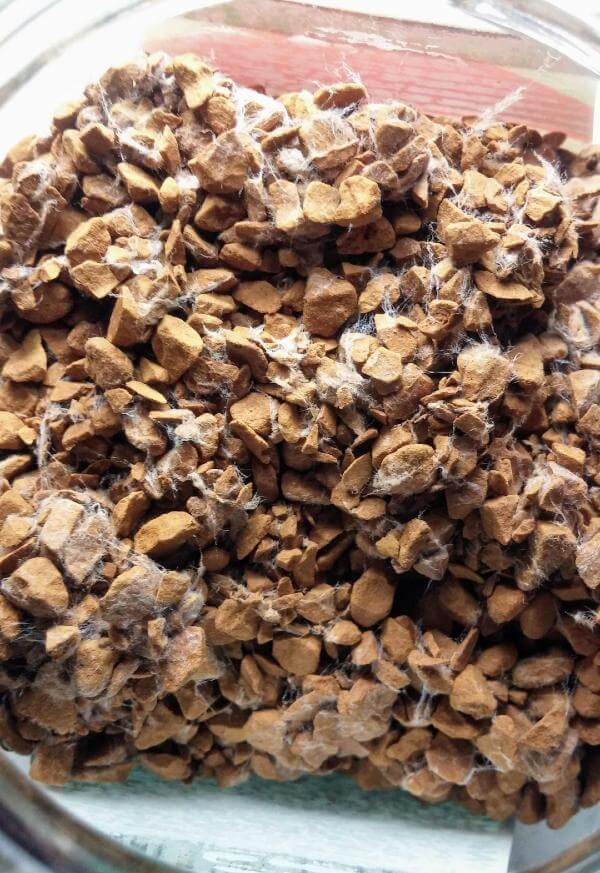
So you start to wonder whether it’s safe to prepare a cup with this suspiciously old product. Believe it or not, many people have found themselves in a similar situation, trying to figure out whether instant coffee actually expires. If you’re wondering what to do with the unopened jar of Nescafe that’s been staying in your cabinet for God knows how long, you will definitely find this post useful. By reading through you will find out what is the shelf life of instant coffee and those cappuccino instant packets, and whether they go bad or expire with time.
So let’s dive in.
Does Instant Coffee Expire?
Simply put, instant coffee consists of dehydrated crystals of coffee. That being said, one of the main reasons why a product goes bad is because of its moisture content.
Instant coffee doesn’t actually expire, because virtually it contains no moisture. If it’s been properly stored, it’s safe for consumption even if it’s passed its “best by” date. Nevertheless, as time goes by, your instant coffee may lose some of its flavor and aroma, resulting in a dull and sometimes unpleasant taste.
As you might’ve noticed, there isn’t actually an expiration date printed on instant coffee jars, cans, or packets. There is a “best by” or “best before” date, which is basically a quality indicator. These show a date up to which you can expect your instant coffee to retain its optimal flavor and quality. You can find out more about food product dating by by visiting the USDA website.
Shelf life and Storing Conditions of Instant Coffee
Instant coffee has a shelf life of over 20 years. No matter whether it’s opened or unopened, it won’t go bad, especially if it’s properly stored. You should store instant coffee in a cool, dry place.
Some experts would also recommend keeping your instant coffee in a dark place, as light may also hurt its flavor by promoting oxidative reactions. Those reactions are a consequence of exposure to oxygen and result in a flavor release, which makes your coffee go stale. That’s why instant coffee is usually packaged in a low-oxygen atmosphere, which prevents the loss of aroma.
Nevertheless, once the jar (or another type of package) is opened, the oxidation begins and the flavor starts to fade away. That being said, even if the flavor is compromised, this doesn’t mean that the instant coffee is spoiled – it just means that it won’t taste as well as you might’ve expected.
In other words, if you’ve had a jar of instant coffee for 5 years, it will likely be good to use today. If it’s been stored properly, it might even taste just as well as it did when you first bought it. If it’s been unopened this whole time, the chances of a positive outcome grow even bigger. On the other hand, if the instant coffee has been exposed to unusual amounts of light, heat, or humidity then its flavor will be notably affected by the improper conditions of storage.
Furthermore, if you’re introducing moisture into the instant coffee jar, it may lump together and even develop fungi and mold.
By RandomBitFry
Make sure you never scoop out your instant coffee with a wet spoon, as this way you will be introducing moisture into the jar. After all, moisture can induce bacterial growth, and you want to stay away from that.
Anyway, you should always check whether the jar or storage container is properly sealed, as moisture from the air can get in too (especially if the humidity is high). By taking this precaution, you’re also making sure that the original flavor of your instant coffee is better preserved, as you’re limiting its exposure to oxygen.
Single-serve instant coffee packets have an advantage in this aspect – it’s hard to mess up how you handle them. The packets keep the product in perfect condition until it’s used and there’s no opening and closing involved. After all, one packet equals one serving – pretty convenient, right? Such is the case with the popular Starbucks instant coffee packets or those by Nescafe (click the links to check them out on Amazon). Most likely they’ll be in great condition years after the “Best Before” date printed on them.
The same applies to instant cappuccino and latte single-serve packets and larger cans (like this one by Folger’s).
Even though they contain powdered milk, and/or powdered creamer, as long as you keep the moisture away from the package, they won’t go bad for years.
So it’s safe to prepare and consume instant cappuccino even if you’ve had the powder for a while.
Of course, you should always check for a notable change in the product’s texture, color, or the way it dissolves.
With all being said, the most adequate test that will show if it’s a good idea to have your old instant coffee is to try it out. Dissolve it in water, as per usual, and take a sip from it – if it tastes decent, feel free to use it as a source of caffeine.
Conclusion
I hope that you found this post helpful.
Over the years I’ve heard a few ill-informed people say that expired instant coffee could cause death, which is far from the truth, as you already know.
Instant coffee is one of the products that have the longest shelf life. Even though I’d never substitute my freshly roasted beans for it, I have to admit it – it has its advantages. That’s why I always have a jar of Nescafe in my cabinet. The one that I currently have is about 2 years old and I only use it every once in a while when I feel like treating myself to a homemade Frappuccino (here on the Woke Lark you can find quite a few copycat Starbucks Frappuccino recipes).
With that being said, if I feel like the instant coffee I have at hand doesn’t live up to my standards, I throw it in my compost bin.
Some people say that instant coffee may also be used in the garden as a repellent for some bugs. I’ve only tried this with spent ground beans and it didn’t work, but fortunately, there are other ways to reuse coffee grounds.
Overall it’s good to know that you don’t have to get rid of instant coffee once it’s passed its “best before” date. Especially considering the amount of food that’s been thrown away daily by the average consumer.
Anyway, leave me a comment below if you have any questions or simply share your thoughts on this post.



Apparently Instant Coffee stored in a cool ,dark dry place stays fresh for a long time .Back in 2011, we were emptying my inlaws home .They had a lot of stockpiled Instant coffee which we threw out along with the usual .We kept some of the Maxwell House Instant Coffee in the 1976 bicentennial containers as our son was born this year . Well ,since we had several I opened 1 just for the heck of it .It was delicious -not just ok . I couldn’t believe coffee stored in the basement for 35 years was not only good but delicious . Only wish we kept all of them .
I kept a jar of nescafe made in China gifted to me 2 years ago. It’s granules are good/nice. No moisture. So it’s safe to take it?
I found a 7 year old jar of folger’s instant coffee in my basement in it’s unopened plasticorginal jar. But it looked like moisture had gotten into jar would you toss it?
Yes , if there’s moisture in the jar
Does this apply to 3 in 1 ? Does the powdered cream and sugar go bad?
Hey, roninsc!
Since it’s dehydrated, cream powder shouldn’t go bad, as long as it’s properly stored – away from moisture. I’d generally recommend consuming 3 in 1 coffee sticks within 2 years after purchasing them. If their packaging is intact, it’s generally safe to consume them even after the second year. Just make sure that they are well-sealed and the powder inside has been kept away from any humidity and moisture during storage.